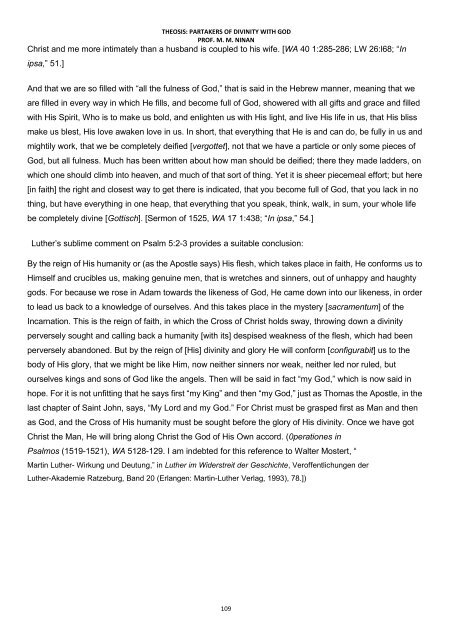Theosis
You also want an ePaper? Increase the reach of your titles
YUMPU automatically turns print PDFs into web optimized ePapers that Google loves.
THEOSIS: PARTAKERS OF DIVINITY WITH GOD<br />
PROF. M. M. NINAN<br />
Christ and me more intimately than a husband is coupled to his wife. [WA 40 1:285-286; LW 26:l68; “In<br />
ipsa,” 51.]<br />
And that we are so filled with “all the fulness of God,” that is said in the Hebrew manner, meaning that we<br />
are filled in every way in which He fills, and become full of God, showered with all gifts and grace and filled<br />
with His Spirit, Who is to make us bold, and enlighten us with His light, and live His life in us, that His bliss<br />
make us blest, His love awaken love in us. In short, that everything that He is and can do, be fully in us and<br />
mightily work, that we be completely deified [vergottet], not that we have a particle or only some pieces of<br />
God, but all fulness. Much has been written about how man should be deified; there they made ladders, on<br />
which one should climb into heaven, and much of that sort of thing. Yet it is sheer piecemeal effort; but here<br />
[in faith] the right and closest way to get there is indicated, that you become full of God, that you lack in no<br />
thing, but have everything in one heap, that everything that you speak, think, walk, in sum, your whole life<br />
be completely divine [Gottisch]. [Sermon of 1525, WA 17 1:438; “In ipsa,” 54.]<br />
Luther’s sublime comment on Psalm 5:2-3 provides a suitable conclusion:<br />
By the reign of His humanity or (as the Apostle says) His flesh, which takes place in faith, He conforms us to<br />
Himself and crucibles us, making genuine men, that is wretches and sinners, out of unhappy and haughty<br />
gods. For because we rose in Adam towards the likeness of God, He came down into our likeness, in order<br />
to lead us back to a knowledge of ourselves. And this takes place in the mystery [sacramentum] of the<br />
Incarnation. This is the reign of faith, in which the Cross of Christ holds sway, throwing down a divinity<br />
perversely sought and calling back a humanity [with its] despised weakness of the flesh, which had been<br />
perversely abandoned. But by the reign of [His] divinity and glory He will conform [configurabit] us to the<br />
body of His glory, that we might be like Him, now neither sinners nor weak, neither led nor ruled, but<br />
ourselves kings and sons of God like the angels. Then will be said in fact “my God,” which is now said in<br />
hope. For it is not unfitting that he says first “my King” and then “my God,” just as Thomas the Apostle, in the<br />
last chapter of Saint John, says, “My Lord and my God.” For Christ must be grasped first as Man and then<br />
as God, and the Cross of His humanity must be sought before the glory of His divinity. Once we have got<br />
Christ the Man, He will bring along Christ the God of His Own accord. (0perationes in<br />
Psalmos (1519-1521), WA 5128-129. I am indebted for this reference to Walter Mostert, “<br />
Martin Luther- Wirkung und Deutung,” in Luther im Widerstreit der Geschichte, Veroffentlichungen der<br />
Luther-Akademie Ratzeburg, Band 20 (Erlangen: Martin-Luther Verlag, 1993), 78.])<br />
109

















